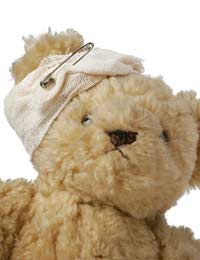Soft Toy Manufacture and Safety

All babies and children seem to love soft toys, and most of us can remember having our first teddy bear and loving it to bits.
[Things have moved on since we were children though, and now there are stringent rules that apply to soft toys. There’s more awareness of safety and suitability, so when you’re looking for that perfect soft toy, there are a few essential things to look out for.
Soft Toys, Baby Toys and Very Small Children
Soft toys are great play things for small children, as they can stretch their imaginations with little risk of ending up hurting themselves. There’s a huge range of soft toys available for babies and small children – even most older kids love soft toys (as do some grown adults...)
You can find almost anything under the label of soft toy – dolls, teddies, balls and skittles, baby toys like soft rattles and books.
Always choose cloth toys over fake fur or hair when you’re buying for very little people, as they love to chew and suck things they shouldn’t and this means that fur and hair are a choking hazard. Likewise it is important to avoid toys with hard buttons or eyes that could come off. Never leave soft toys near a sleeping baby.Toy Safety Regulations
Just like any other toy, all soft toys made and sold in the UK must conform to the essential safety requirements in the Toy (Safety) Regulations. These regulations are mainly directed at toy shops and manufacturers who supply toys on a large scale.
Many people make soft toys and baby toys as a hobby, or to make extra money on a small scale which they sell on at craft fairs or markets. They also have to abide by the rules, so if you buy soft toys from a supplier like this, just check that they know their responsibilities!
Soft Toy Manufacture – What Are the Dangers?
Toys are meant to be fun, not dangerous, so manufacturers have to look out for several things when they make a toy for sale.
- Soft toys’ eyes, noses or facial features can be removed – if a child pulls them off and eats them they could potentially choke on these small parts. This is especially important for baby toys.
- Flammable fabrics on soft toys are an obvious no-no.
- Sometimes, but luckily this is quite rare, pins can be left inside the toy.
Safety Tips for Soft Toys
When you’re thinking about buying that cute teddy, baby toy or soft toy, just have a quick run-through of this checklist before you part with any cash...
- Look for an obvious CE mark - and that it carries the manufacturers name and address.
- Check for a quality mark such as the Lion Mark, which is a symbol of safety and quality backed by a Code of Practice.
- Have a good tug at the small parts on the soft toy – does the toy seem to be well made and properly finished? Can you see any loose filling or loose hair? Are there any tiny parts that a small child could decide to try and eat, then choke on? How well attached are the eyes and facial features?
At the end of the day, most soft toy manufacture is carried out safely and according to the regulations, and by following a few common sense rules, teddies and cuddly toys will be a part of your child’s life for years to come!


Re: How Well Made are Toys from China?
Kak esehiko sminor k112 toysadvice.co.uk
Re: Toy Safety Standards in the UK
Selling handmade knitted, crocheted and fabric toys for charity. How do I find out information re the chemical compounds in the…
Re: Toy Safety Standards in the UK
I have bought some small packaging, shipping boxes from Amazon and decorated them with stickers and other eye catching…
Re: Toy Safety Standards in the UK
Hello. Can you tell me if I need a test for a certified safe wooden doll that has been painted with acrylic paint and has a…
Re: Second Hand Toys: What Are my Rights?
Recently sold (reluctantly) a transformer listed on a Facebook transformers selling page for £35, listed price was…
Re: Toy Safety Standards in the UK
Robie szydelkowe misie, laliki, z wlóczki sprzedawanej na rynku( yarnart jeans itp). Co powinnam zrobic aby móc je sprzedawac…
Re: Toy Safety: What Does the Law Say?
idk
Re: Toy Safety Standards in the UK
Hey, I am hoping to sell some wooden stands to go along side some artwork im selling for children 3+ they are meant to be played…
Re: Second Hand Toys: What Are my Rights?
Please advise...I plan to set up a hoopla stall at summer fete can I give second hand soft plushtoys as prizes? I will…
Re: Toy Safety Standards in the UK
Hi i have currently made up some educational busy books which are made up of laminated paper sheets with velcro laminated…